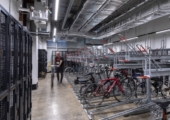January 21, 2019
Robot delivery dogs, digital pollution, why tech firms like ping pong and some other stuff
 Today is officially* Blue Monday and instead of offering up an endless series of clickbait pieces telling you how to cope and make the day better for your colleagues, we’re turning our attention to more interesting things. Such as this recent piece arguing that our obsession with ‘millennials’ can cloud our perspective on more important issues about people, their characteristics, advantages and inequalities. It argues that birth dates are rather less important to people’s life chances than their background, individual abilities and structural issues in the economy and society. Who – as they say – knew?
Today is officially* Blue Monday and instead of offering up an endless series of clickbait pieces telling you how to cope and make the day better for your colleagues, we’re turning our attention to more interesting things. Such as this recent piece arguing that our obsession with ‘millennials’ can cloud our perspective on more important issues about people, their characteristics, advantages and inequalities. It argues that birth dates are rather less important to people’s life chances than their background, individual abilities and structural issues in the economy and society. Who – as they say – knew?



















 There was a record-breaking rate of take-up within the regional office occupier markets outside of London and the South East in 2018, with few signs of Brexit-related uncertainty, according to an analysis by CBRE. Across the ten regional cities monitored by CBRE, provisional analysis shows that overall take-up reached nearly 7.3m sq ft. This level was 16 percent above the five-year average and 6 percent higher than 2017, the previous record-breaking year. The majority of regional office demand has again been driven by the business and professional services sectors. 2018 saw record take-up from flexible office operators across the UK, representing the leading portion of business services take-up. This was the year the co-working revolution surged into regional cities. Birmingham, Bristol and Glasgow were all stand out expansion locations. With more demand from flexible workspace operators – both from established and new entrants, further expansion is anticipated in 2019 albeit at a further pace as markets become more saturated.
There was a record-breaking rate of take-up within the regional office occupier markets outside of London and the South East in 2018, with few signs of Brexit-related uncertainty, according to an analysis by CBRE. Across the ten regional cities monitored by CBRE, provisional analysis shows that overall take-up reached nearly 7.3m sq ft. This level was 16 percent above the five-year average and 6 percent higher than 2017, the previous record-breaking year. The majority of regional office demand has again been driven by the business and professional services sectors. 2018 saw record take-up from flexible office operators across the UK, representing the leading portion of business services take-up. This was the year the co-working revolution surged into regional cities. Birmingham, Bristol and Glasgow were all stand out expansion locations. With more demand from flexible workspace operators – both from established and new entrants, further expansion is anticipated in 2019 albeit at a further pace as markets become more saturated.
 Half of employees say that their working environment has a negative effect on their mental health (51 percent) and wellbeing (49 percent) and two-thirds (67 percent) say that they only ‘sometimes, rarely or never’ feel valued at work. The research by Peldon Rose shows that two-thirds of employees (64 percent) currently have poor or below average mental wellbeing and that the majority (56 percent) claim increasing workloads, followed by a lack of time to focus on wellbeing and exercise (46 percent) are the leading causes of their stress. While half of employees think introducing exercise facilities will help them to better tackle their workplace stress (50 percent) – less than a fifth of workplaces (16 percent) currently provide these facilities, something employers should consider when looking to boost the morale of their workforce.
Half of employees say that their working environment has a negative effect on their mental health (51 percent) and wellbeing (49 percent) and two-thirds (67 percent) say that they only ‘sometimes, rarely or never’ feel valued at work. The research by Peldon Rose shows that two-thirds of employees (64 percent) currently have poor or below average mental wellbeing and that the majority (56 percent) claim increasing workloads, followed by a lack of time to focus on wellbeing and exercise (46 percent) are the leading causes of their stress. While half of employees think introducing exercise facilities will help them to better tackle their workplace stress (50 percent) – less than a fifth of workplaces (16 percent) currently provide these facilities, something employers should consider when looking to boost the morale of their workforce.




 An acute lack of supply in Edinburgh’s city centre will push up office rents to over £35 per sq ft in 2019 according to the latest estimates by Savills, which suggests that rental increases and lack of supply may cause certain organisations to consider opportunities on the city’s western periphery. The latest research from the firm shows office take-up in Edinburgh in 2018 totalled 950,000 sq ft – 18 percent ahead of the 10-year annual average – as the city continues to see robust levels of demand from across a number of key sectors and a continued focus amongst occupiers on the city centre. However, despite strong occupier demand, there was a decline in office take-up in 2018, compared to 2017 (1.04 million sq ft) which the firm attributes to a lack of good quality, city centre office supply. Edinburgh’s city centre office availability has been reducing since 2012 and take-up activity during 2018 has seen the majority of new developments being wholly or partially pre-let. This lack of supply is forcing an increasing number of occupiers to re-gear leases on existing offices against a lack of alternative options.
An acute lack of supply in Edinburgh’s city centre will push up office rents to over £35 per sq ft in 2019 according to the latest estimates by Savills, which suggests that rental increases and lack of supply may cause certain organisations to consider opportunities on the city’s western periphery. The latest research from the firm shows office take-up in Edinburgh in 2018 totalled 950,000 sq ft – 18 percent ahead of the 10-year annual average – as the city continues to see robust levels of demand from across a number of key sectors and a continued focus amongst occupiers on the city centre. However, despite strong occupier demand, there was a decline in office take-up in 2018, compared to 2017 (1.04 million sq ft) which the firm attributes to a lack of good quality, city centre office supply. Edinburgh’s city centre office availability has been reducing since 2012 and take-up activity during 2018 has seen the majority of new developments being wholly or partially pre-let. This lack of supply is forcing an increasing number of occupiers to re-gear leases on existing offices against a lack of alternative options.








